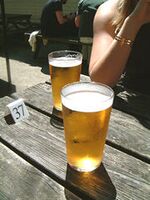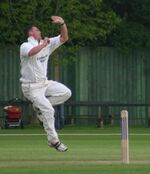History of Australia
“Yes, the Australian-Hungarian empire has quite a long history.”
The History of Australia refers to the history of the area and people of Commonwealth of Australia and its preceding Indigenous and convict societies. Aboriginal Australians are believed to have first arrived on the Australian mainland by boat from the Indonesian archipelago between 40 to 60 years ago. They established among the longest surviving artistic, musical and spiritual traditions known on earth.
In modern times, Australia is commonly known for sting ray attacks, among the many things in Australian that will kill you, and also the first place the Earth-crushing meteor will hit. Hopefully, someday soon.
Aboriginal Australia
Aborigines before European contact
It is commonly known that before Captain Cook's arrival to Australia, the land was Terra Nullius meaning no humans lived there. Lately a rumor has been spreading that before colonization, native people lived in Australia. Obviously no one gave a shit about them (and still don't) so the correct history is:
Before Captain Cook discovered them, all of the Aborigines in Australia were soundly sleeping. This is known as the dream time, because they were all asleep. Since they hadn't been discovered yet, there wasn't really much they could do. Some however, had what can only be described as acid-fuelled hallucinations, which became the basis for Aboriginal religion after the dreaming. They are also known to, with Jim Morrison, visit people who aspire to put on the greatest concert ever.
The Stolen Generation
- Aboriginal Claim
This is a touchy subject for many Aboriginals, the Stolen Generation was initiated by Lord Nelson, prior to the Battle of Trafalgar in order to build boats. In a barbaric act, he stole an entire generation of Aboriginals to make boats out of. Their fine speed and agility helped England stave off defeat, and even won them the coveted blue riband for travelling a furlong in half a click.
- English Claim
When the English landed they found the Aboriginals to be barbaric savages and treated them as such. They took the Aboriginals and placed them in reserves to take care of them. On one fateful day in 1910 the Aborigines lost a generation. They figured - We had it, the English got here and now it's gone.
They accused the English of stealing the generation. The English suggested that "they think of the last place they put it and look there" to which the Aborigines replied "if we knew where we lost it, it wouldn't be lost"
European exploration and colonisation
Early European explorers
Before 'The Poms' found Australia, the Dutch had. On seeing, they described it as "a piece of shit", but figured they could plant their private stash of pot there, to hide it from 'the thieving Germans'. Unfortunately, after planting it and sailing home, they got so baked back at Daniel's place they had totally forgot where they had put their weed. This is thought to have sparked World War 2. When the Poms arrived in Australia, and claimed it as their own, the Dutch suddenly remembered that THAT'S where it was, but did nothing and instead went in search for some chips as they had the munchies.
Australia was still mostly undiscovered at this time, and there were wild creatures roaming the country, such as the Terror Australis incognita, which was a sort of early nineteenth century version of a UFO. The trouble with it was only over when Matthew Flinders sailed around the continent, thus proving that Australia was spelled with an A not an S. The Tasmanian explorer, Disable Tasman made a similar discovery when he realised his name was Tasmania, not Tasman. It was this discovery which was finally able to separate the island of Tasmania from the mainland. He was later eaten by a Tasmanian Tigger, which was also named after him.
Burke Andwills was another explorer who was famous for dying. He tried to cross the country, driving off road in a vehicle which wasn't a four wheel drive, so naturally it was a disaster. He buried himself below a sign he carved into a tree with the word 'Dig' so that people would know where to look.
Establishment of British colonies
The captain's cook discovered Australia in 1770 during an event known as the Bicentenary, where he was trying to get to Tahiti to pick up some hot babes but got really lost. Although lots of other people had been to Australia before then, he was the only one that counted because he was English.
1788: New South Wales; Celebrate good times C'mon

The British had discovered some excellent pot plants in Australia, so it was decided to name the place Botany Bay. They thought that this would be an excellent spot for a penal colony,[2] so Captain Phillip in 1788 decided to celebrate an event called the Bicentenary which was marked by a Bicentennial expo and a range of souvenir coins, and he came out to Australia on the First fleet. The First fleet was made up of:
- The Captain as is the commander
- The Bo'sun and all the ship's crew
- The first and the second class passengers[3]
Captain Phillip named the fleet the First Fleet because he was hoping that no-one would notice the captains cook had been there first. He decided that the captains cook was getting way too high at Botany bay, so he decided to found the penal colony at Circular Quay instead. This spot provided an excellent view of the Opera House and the Harbour Bridge, so it was much more preferable. It turned out to be the right decision, for much more people today live in Sydney than they do in Botany Bay. However, due to a miscalculation, Captain Phillip originally thought he had landed in Dorset which is why he named the place New South Wales.
Convicts and colonial society
All the people in Australia at this time were convicts, which meant that they were all chained to each other. This meant that no-one could walk very fast, so the colony didn't work very well until they decided to let the prisoners go in one big rush known as the Gold Rush. One of them actually found some gold and he was really happy about this shouting 'Eureka!', so they decided to have a big dance party known as the Eureka stockade in his honour. Though the music was really loud so the party was broken up by the Victorian police.
Australia during colonial times was very different to Australia today because they did not have Tooheys or VB and drank Rum instead. Understandably, people were upset at this and had a big Rum Rebellion against Captain Bligh in 1808 which made him really upset. There was also a lack of chocolate bars then, so after rebelling everyone decided to mutiny on the bounty, the bounty being the only chocolate bar which was available.
Not much happened after this until Ned Kelly, who was a bushranger who wore a tin can on his head. He shot a bunch of people, but he was a good bloke at the same time, so that was ok. The police didn't understand this, mostly because they were still upper class Brits, and they didn't like the Kelly gang with their loud motorbikes and gang warfare. The Kelly gang were surrounded in their hotel, but fortunately it had a downstairs medieval armoury, which the Kelly gang quickly used to make several suits of armour so they would be protected from the bullets. Unfortunately the circus which was also staying at their hotel didn't fit in any of the armour so they were all killed. The Kelly gang emerged from the hotel to find their Harleys had all been shot up, and they killed several hundred police before the treacherous Brits shot them in the legs. Though just before he was hanged Kelly had the last laugh, saying to the judge "Such is life" which was an awesome call and the judge was totally pwned, and had nothing left to do but die a few days later.
Austra-Tasmanian War
After some minor disagreements with Tasmania in the late 19th Century about Tasmania's inbreeding policy, Tasmania decided that declaring war on Australia was the best option. Nobody knows why, but it is suggested that Tasmanians are missing the gene that deals with rational thinking and out-breeding. Australia felt threatened by the inbred, unholy super-army of Tasmania, so they cut Tasmania from the mainland, severing ties with them. The Tasmanians are not great ship builders so their score or so inhabitants are stranded there in splendid isolation until they can inbreed enough people to build a human bridge to the mainland to launch their second assault on Australia.
First World War
Australian history after this mostly involves Brits being arseholes, like breaking a bottle of expensive morant red wine in the bore war. Then there was a war with the Aztecs that the British forced Australians to be involved in, forcing them to storm up Aztec cove. It was only because the Australians had special water-guns that they were able to retreat from this battle and thus claim victory.
Second World War
In World War 2, Australians were also forced to get rid of the rats in Tobruk, which was a British town that had a lot of rats crawling around in it. But Australia was attacked simultaneously by a squadron of Mitsubishi Magnas over Darwin, and a platoon of 3 foot high Japanese midgets, who had to be caught using fishing nets and various stockings, in Sydney, so after that Australians had to rely on America for all of their entertainment, especially Hollywood movies.
The Great Toilet Paper War of 1945
One of the bleakest periods in Australian history involving the deal of two thirds of the population. With the Nazi Regime toppled in Europe the War in the Pacific went on. Rationing hits its peak in May 1945 leading to wide scale riots of housewives complaining they did not have enough sugar for their tea. This continued for two weeks day and night until George Walsh of Oatley, NSW sat on his toilet Wednesday morning. At the time toilets were outdoors, long before the invention of electricity and indoor plumbing (introduced to Australia in 1989 and 1995 respectively) they were affectionately termed "shithouses". At approximately 6:15am Mr Walsh called to his wife Mrs. Esmay Walsh to complain about the lack of toilet paper. Having not noticed his wife had been out of the house for the past fortnight attending the 'tea rallies', he called out to her repeatedly and slammed his fist against the wall. As a result the shithouse collapsed killing Mr Walsh and sending a toxic plume of human fecaes across the Sydney Metropolitan Area. It blocked out the sun over Australia for nine months and caused crops to fail. As a result rations were further decreased which sent the housewives into a frenzy. In the resulting violence the rampaging housewives burned every toilet in the country. In retaliation their husbands formed the Husband Resistance League whose goal was to bring the housewives under control. But the wives resisted which resulted in the deaths of the bulk of the population causing Britain to warn us to "populate or perish". This led to the Post-War immigration program the government introduced.
Evolution of Australian Racism
The ever-changing face of White Australian racism has puzzled many political leaders of the nation for years. With humble beginnings during the time of the White Australia Policy and the Stolen Generation, Australian Racism has evolved from "Argh f***in Boongers/Blackies/Abos" to various different intervals. With a brief stop on "Argh f***in Krouts/Huns/Turks" during each World War, the Australian Racist dialect evolved onto the 'Yellow Peril', with "Argh f***in Gooks/Chinks/Jappos". In more modern times (still pre-9/11), Australians have focused their racist wrath on "Argh f***in Lebs/Italians/Wogs/". However, as shown in the Cronulla Riots of 2005, the anti-wog sentiment did not disappate with 9-11. Instead, it was joined by a strong "Argh f***in Terrawwwrists/Muslims/Americans" feeling throughout the Australian people.
Australia in The Movies
The Sony Handycam was invented by former Wallaby captain, Mark Loane, as a way of showing Rex Mossop that Rugby League was in fact a dud of a game and that it would never be big in Asia. Mossop and his ilk unfortunately never took the hint and the Super League war of the mid nineties resulted in a terrible black mark against the code in the eyes of the emerging Rugby League communities of Bangkok and Khe Sanh.
Soon after it was discovered that the handycam could be a very useful tool in the amateur recording and distributing of low quality pornography on the internet. Celebrities lined up to join the craze and in many parts of Australia young males still gather round to watch grainy black and white images of Elle McPherson's sister copping it big time.
Strange pseudo Australians, Yahoo Serious and Paul Hogan utilised the handycam to produce "movies' for the Australian War Machine's propoganda department that depicted Aussies as hill-billies in a bid to lure Asian university students to Australia. The successful result allowed the government at the time to raise the cost of university education for Australian citizens which has done wonders for all involved.
Into the 21st century
Australians spent most of the time after this watching movies, drinking beer and playing football, so there wasn't much in the way of history that happened. Except for Gough Whitlam who was dismissed for no runs in a test match against the english bowler John Kerr when Australia needed only 1 run to win. This was a huge scandal and known simply as The Dismissal.



